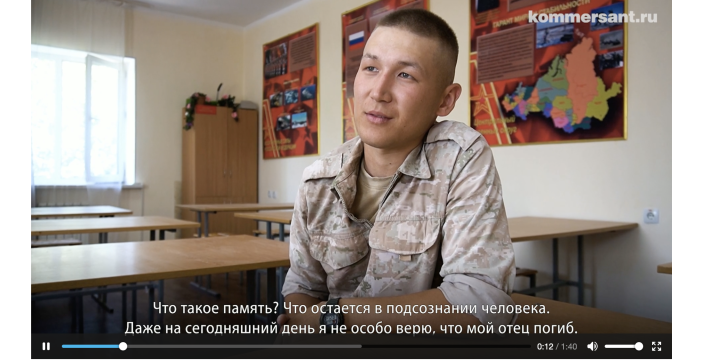Fanis Ishmuratov was a 26-year-old turbine technician when he died aboard the Kursk, a submarine that sank in the Barents Sea on April 12, 2000, just weeks after Vladimir Putin’s election to the Russian presidency.
Ishmuratov left behind a 3-year-old son, Danis, who would follow his father into the military, eventually joining the Russian army as a contract soldier, based most recently at the 201st Military Base in Tajikistan.
Last week the newspaper Kommersant reported that the younger Ishmuratov, 25, had been killed in Ukraine. He was an only child.
It is difficult not to see the tragedy of the Ishmuratov family as the tragedy of Russia under Putin, which emerged from the post-Soviet twilight as a resurgent economic and military power. But if that resurgence has been evident in the restored imperial palaces of St. Petersburg (Putin’s native city) and the glittering high-rises of central Moscow, it has come at enormous human cost, borne most often by the residents of Russia’s seemingly infinite hinterlands.
These are the soldiers and miners, roughnecks and sailors who power Russia — and are often invisible to the elites who, until recently, could enjoy entrée into the high societies of London and New York.
According to Kommersant, Danis Ishmuratov lived in Ufa, the capital of the state of Bashkortostan, near the border with Kazakhstan. The region is home to people of Central Asian, not Russian, ethnic descent. Young men from Central Asia and the semiautonomous regions in and near the Caucasus Mountains (Chechnya, Dagestan) have in part powered the Russian war effort in Ukraine, thousands of them dying in Putin’s quest for Slavic unity.
In an interview with Kommersant published earlier this year, Danis Ishmuratov said he could not remember his father — but he thought of him constantly. “You can say that my father is an idol for me,” he told a reporter. “But I don’t compare myself to my father. I think it’s too early to compare.”
The sinking of the Kursk was the first tragedy of Putin’s rule. Installed in 1999 as acting president to replace the increasingly incapacitated Boris Yeltsin, the young former intelligence officer could hardly have been expected to account for the decrepit state of the enormous Russian military. But although Russians did not blame Putin for the sinking of the Kursk, which took place during a naval exercise, his response to the disaster was an ominous sign of what was to come.
Putin was vacationing in Sochi, a Black Sea resort, when he was told that an explosion had torn through the Kursk and that the submarine had sunk to the floor of the Barents Sea. The news found him “in a stupor,” the British journalist Catherine Belton would later write. “He didn’t know how to deal with it, and therefore he avoided dealing with it,” someone who was a Kremlin official at the time told her.
Twenty-three sailors had survived the initial blast. Sequestered in the relative safety of the submarine’s aft ninth compartment, they were certain that rescuers would soon arrive. But although Western naval services offered Russia help almost right away, the Kremlin spurned such offers, fearing international embarrassment. Military officials also worried that a rescue operation conducted by Sweden or the United Kingdom — the most likely candidates to launch such an effort — would result in revelations about Russia’s nuclear submarines.
As a result, all 23 of the Kursk survivors died, along with the 95 shipmates who perished in the initial blast. According to Danis Ishmuratov, his father had been among those legendary survivors. His body was eventually recovered, according to Radio Free Europe, and interred in his native Bashkortostan.
At the time, Russian society still enjoyed a measure of openness, and the grieving families of the Kursk dead assailed Kremlin officials — including Putin himself — for failing to do more. But instead of seeing the tragedy as a turning point that could orient Russia toward greater accountability, Putin regarded the Kursk episode as an indictment of open society, in which journalists and ordinary people could ask questions without easy, pat answers.
“This is a new country, sure, but its leaders were brought up under the old system. It’s impossible to change their mentality,” a submarine officer told the Washington Post at the time. The war in Ukraine can be seen as an even more damning sign of how little reform has been achieved since the collapse of the USSR in 1991. As in the bleakest Soviet times, a cloistered Kremlin seems to be leading ordinary Russians into ruin.
Earlier this year, Danis Ishmuratov spoke to Kommersant for a series on the children of the victims of the Kursk. Dressed in military fatigues, his hair closely cropped, he showed a reporter photographs of his father on his iPhone: a handsome young man with dark hair.
“My first childhood memory is of my father’s funeral,” Ishmuratov said.
The younger Ishmuratov studied at Bashkir State Agrarian University, but employment opportunities were few (according to Kommersant, he worked at a car wash and a trampoline park), so he eventually enlisted.
“I dream of becoming an officer,” he told the newspaper, “of raising many children, at least seven — I want to be the father of many. I want to have a house, a banya, children, so that my mother could rejoice in her grandchildren.”




